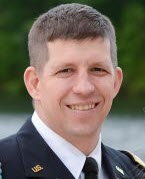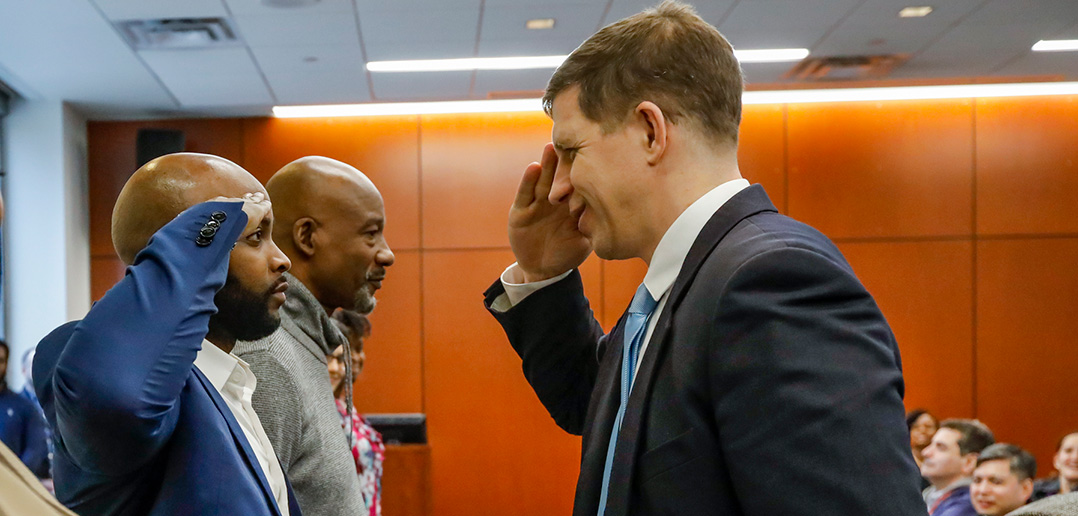Veterans often face challenges reintegrating into their communities after returning home from the service. Talking about their experiences with their civilian counterparts can be difficult and leave both Veterans and civilians feeling they are separated by a vast divide. In response, VA facilitated the
work of an interdisciplinary team of stakeholders, including participants from local VA Vet Centers, the VISN 2 MIRECC, Starbucks Coffee, Bloomberg LP, and Teachers College, Columbia University, in finding solutions to bridge this gap.
84% of Veterans say that Americans don’t understand them.
71% of Americans say they have little or no understanding of Veterans.
In 2016, this team developed and released the Veteran cultural competence training and related programs to help community members in a range of fields — including medical and mental health professionals, business leaders, college faculty and staff members, nonprofit leaders, and local government officials — to improve their communication with the Veterans and Veteran family members they serve or employ.
Cultural competence and Veterans’ mental health
While Veterans and civilians have different experiences, one common denominator is human emotion, such as disappointment, guilt, and isolation.
On average, more than 400 training participants have reported experiencing a significant increase in their ability to work with Veterans.
When civilians in the community understand these shared emotions, it can increase empathy across communities and ultimately improve Veterans’ mental health. Encouraging Veterans and civilians to have conversations around mental health treatment can also help relieve the stigma that some Veterans associate with mental health challenges and reduce the high dropout rate among Veterans who receive mental health care.
Training structure
Veteran cultural competence training typically involves a pretraining course as well as a full day of lectures, workshops, role-playing, and performances. The training is divided into three parts:
- Part One: Military Culture 101 (MC 101) is an online training course provided by the Syracuse University Institute for Veterans and Military Families and by PsychArmor that provides training on military lifestyle, culture, and history to help civilians understand and respond more effectively to the culture, language, and military experience of their Veteran counterparts.
- Part Two: A daylong training immerses participants in military culture, such as military customs and courtesies, and participants work in a simulated military squad including Veterans and Soldiers. Training participants take a survey that helps measure how well they think they understand Veteran culture, and they then receive personalized feedback based on their survey responses. Participants also receive guidance on new methods of communicating effectively with Veterans and service members as they engage with them in their squads throughout the day.
- Part Three: Participants engage in the arts through the Theater of War, in which actors perform excerpts from Greek tragedies. Then, in a truly cathartic experience, they listen to a panel of Veterans and their family members share with the audiences how these tragedies relate to their own lives.
Participant feedback
Immediately following the training and again one month later, the participants complete more surveys and provide feedback. The statistical results show that the training helps the participants significantly improve their ability to work with Veterans. The impact is also captured in their comments. For example, one participant notes:
“I hope to take the skills and tools I learned at this training and become better prepared for mental health first aid in any setting. … I now have more insight and appreciation than most civilians who work with and may encounter Veterans in their line of service. I can work on my own to manage my own biases due to cross-cultural impasses (Veteran and non-Veteran) when they arise in a professional setting and be sure to always let a Veteran know I appreciate and value their military experience and commitment.”
This testimonial is one of many highlighting the course’s impact on participants. Through the expansion of course locations, VA will continue bridging the gap between Veterans and their civilian communities.
Course offerings across the United States
The Veteran cultural competence training course is available in select cities nationwide. The schedule for the coming months is as follows:
| Date | Location |
| October 2019 | Syracuse, N.Y. |
| October 2019 | Albany, N.Y. |
| November 2019 | New York City |
| March 2020 | Rochester, N.Y. |
| May 2020 | Seattle |
| June 2020 | New York City |
| June 2020 | Dallas |
| July 2020 | San Antonio |
| September 2020 | Washington, D.C. |
| September 2020 | Charlotte, N.C. |
To participate in one of the upcoming trainings and to learn more about VA’s work to increase Veteran cultural competence, please email Joseph Geraci at Joseph.Geraci@va.gov.

Author Bio
Joseph Geraci, PhD, LMHC.
Joseph Geraci, Ph.D., is a clinical psychologist and New York State-licensed mental health counselor. A retired lieutenant colonel in the U.S. Army (Infantry), he co-founded the Resilience Center for Veterans & Families at Teachers College, Columbia University. Currently, Dr. Geraci works in VA VISN 2’s MIRECC center of excellence housed at the James J. Peters Veterans Affairs Medical Center in Bronx, N.Y., focusing on education and clinical practice initiatives to assist Veterans.




















